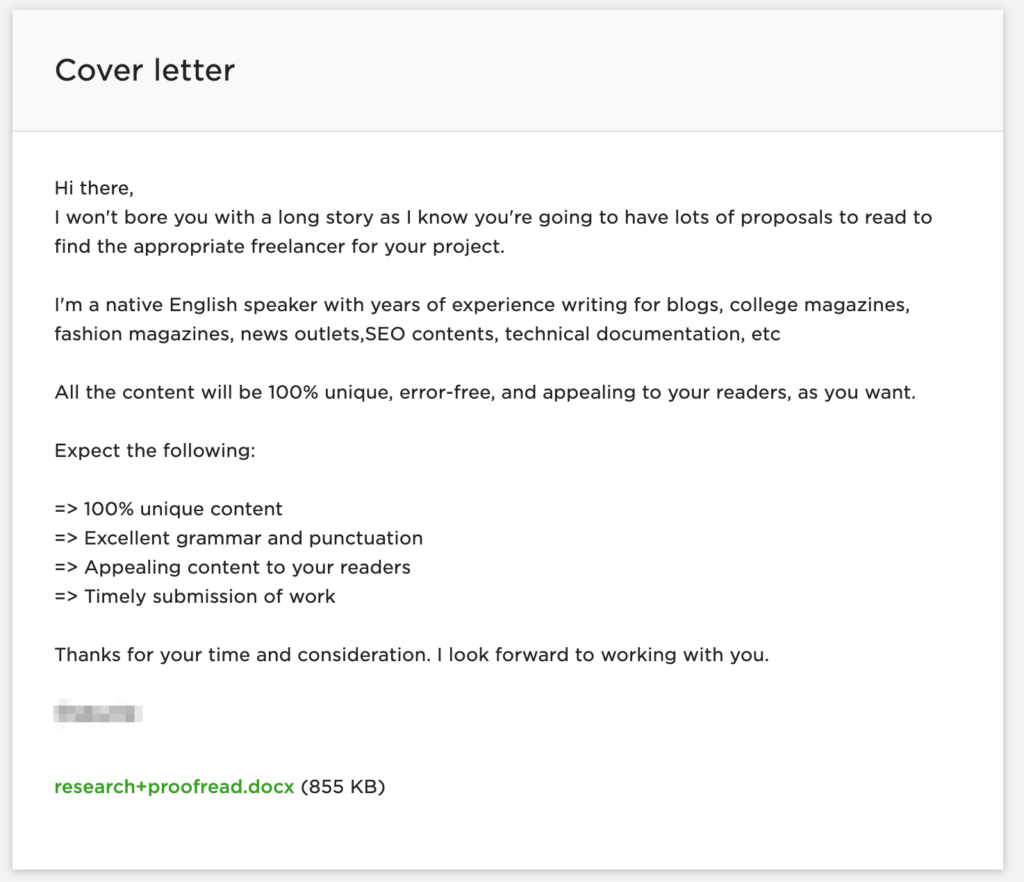In this series, you and I are diving into answering Upwork questions that come up when writing proposals. Today we’ll look at another question: “Why do you think you are a good fit for this particular project?”
With the other questions in the series, we have talked about how to find the question the client is really asking, what the client is trying to understand, and how to best answer it.
This question will be no different, so let’s dive in.
What the client is REALLY asking
The question “why do you think you are a good fit for this particular project?” sounds like a question we’d get at a job interview and once again, it is a template question that clients can add with the click of a button.
That means that they are unlikely to be serious about it but still have to answer it in a professional way.
Most of these questions are sort of a cry for help from the client in wanting us to stand out. One of my own clients told me that even with all the profile details, filters, and questions on Upwork, it is still difficult to find the right person for each project.
The client WANTS us to be the right person for this project. They don’t want to have to sift through any more freelancers — they are busy with their business and want this taken care of smoothly so they can focus on other things.
Their challenge is that it is easy to get exposure to freelance work online these days, so clients experience many unprofessional freelancers. They get proposal after proposal that is copy-paste and braindead. Here are a few examples:


Freelancers explain that they can do the job, in a mediocre way at best, but so does the rest of the proposals the client receives.
That makes it impossible for the client to tell them apart and so they have to ask a ton of questions to try to see who is a good fit.
It is like being on a date where you have to ask all the questions and carry the conversation. It becomes tiring pretty quickly.
But it is another opportunity for us to stand out.
Let’s set aside small projects that don’t require a phone call and are simply transactional, and instead focus on those that are bigger and will make a meaningful difference to your income.
Upwork with its platform can make it easy to think that it is simply a transaction. They want something done and we can do it. Simple and easy.
But often the client isn’t on the same page…
They want all of the above and a big hug.
I know that might sound like a joke but it is not. The clients want to feel understood and reassured that if something happens, we are there to help and that we are easy to work with.
It seems counterintuitive that clients might want a relationship with us as much as they want their project completed technically.
It breeds trust and that is deeper than anything. In fact, our portfolio, case studies, testimonials, and everything else only has one goal. To build trust with the client that we are the right person to help them with the project. That’s it.
To many clients, those marketing materials are ways for them to “outsource” the decision to trust us with the project or not.
It is difficult for them to judge, that’s often why they need help in the first place. By looking at other businesses that they like or trust, they might think that if the business has trusted us, they can too.
And the same is the case with the question “why do you think you are a good fit for this particular project?”
They want to know that they can trust us.
Thus the question behind the question becomes: can the client trust us to deliver a good job on the project?
How to answer “why do you think you are a good fit for this particular project?”
So to answer the question, we need to show the client that they can trust us to do a good job on the project.
The most common approach is to throw some testimonials and case studies at the client. That is a good option but what most of us miss is to explain how they are relevant and why they are included in the proposal.
Clients don’t want to have to guess and think about it when they are busy and have to go through many other proposals.
So it is key for us to help them make that connection. If let’s say, the project is about promoting an online furniture-business with Facebook ads and we have a case study showing exactly that, we don’t need to do much explanation other than piquing their interest and tell them that we got X result from a project with the same type of business and that the case study is attached.
But with all the different types of projects on Upwork, how often is it that we have had a project that is exactly the same?
More often, the project we are looking at is related but not exactly the same. So, we have to bridge the gap for the client and show them why we are bringing it up and how doing a good job there will ensure a good job in this new project as well.
For example, we might have been running Facebook ads for that online furniture business and this client is looking for help with Facebook ads for an ecommerce business selling lamps.
They are related but not entirely. We might say something like:
“I’ve attached a case study running Facebook ads for an online furniture business that yielded X result. While furniture and lamps aren’t exactly the same, both are upscale products and the customers are similar.
They are not looking for the cheapest solution but rather something that shows off their personality and interests. Something that they can show to friends and family when they visit and perhaps even bring back memories from a trip or experience abroad.
Throughout the project, I noticed that images with highly contrasting colors and with the product placed in a real-life setting (e.g. a living room) worked well. I figure it might work well for your project too.”
What’s going on here?
I specifically avoided asking a question because this is only a small part of the proposal and I don’t want the client to have to scroll back and forth to find all the questions throughout the proposal.. it will usually make them feel overwhelmed and they usually don’t answer more than one question anyway.
We could have made this a lot longer but there are usually going to be other questions to answer, not to mention the cover letter, so altogether it will become a lot for the client.
The key is not to be hired but to get a response from them.
If you’ve been following the blog, you know that this is not the easiest approach out there. Other websites will show you shitty copy-paste answers.
If you are ambitious and OK doing some extra work up front, you’ll be rewarded with amazing results.
Other questions in the series:


